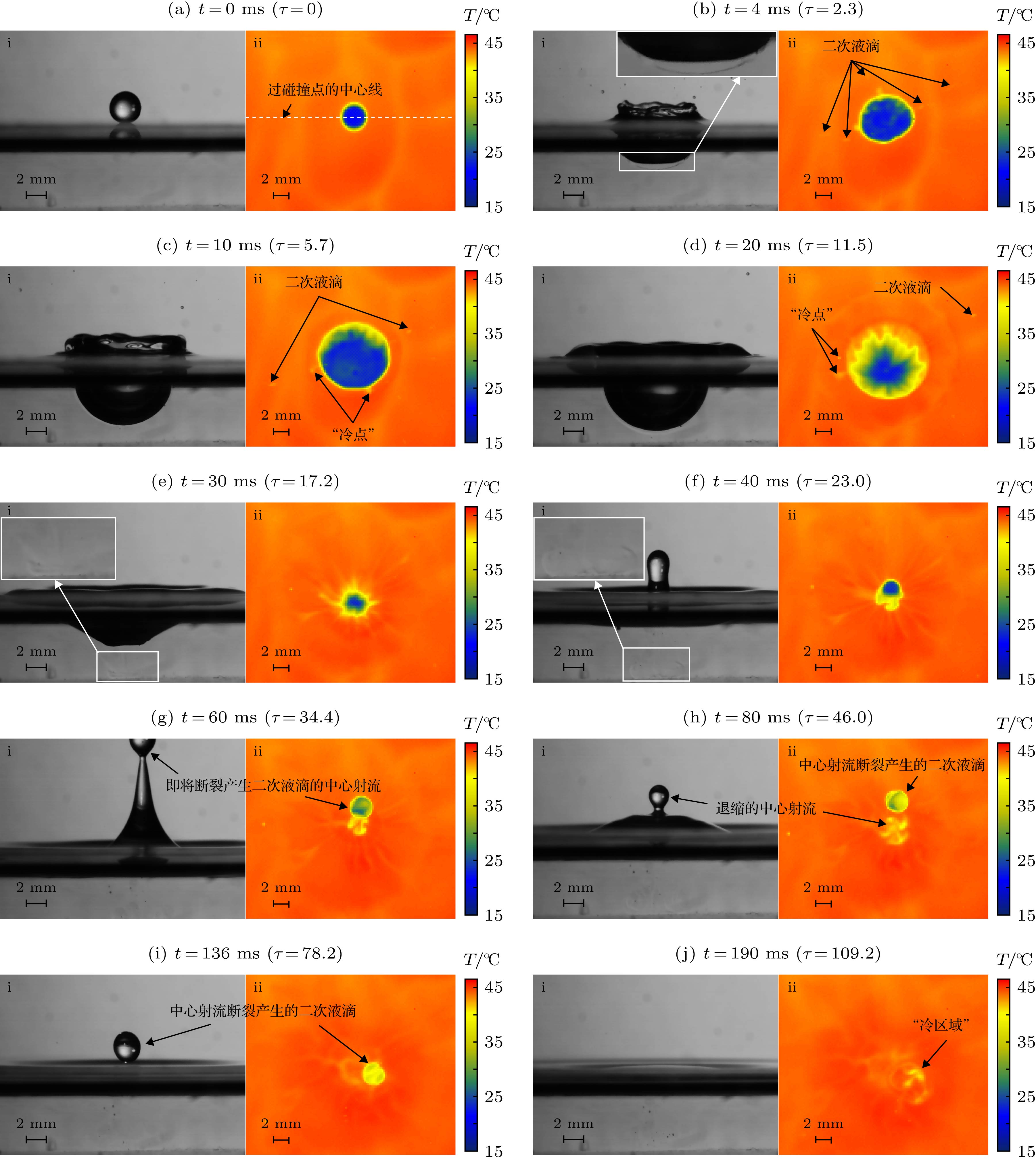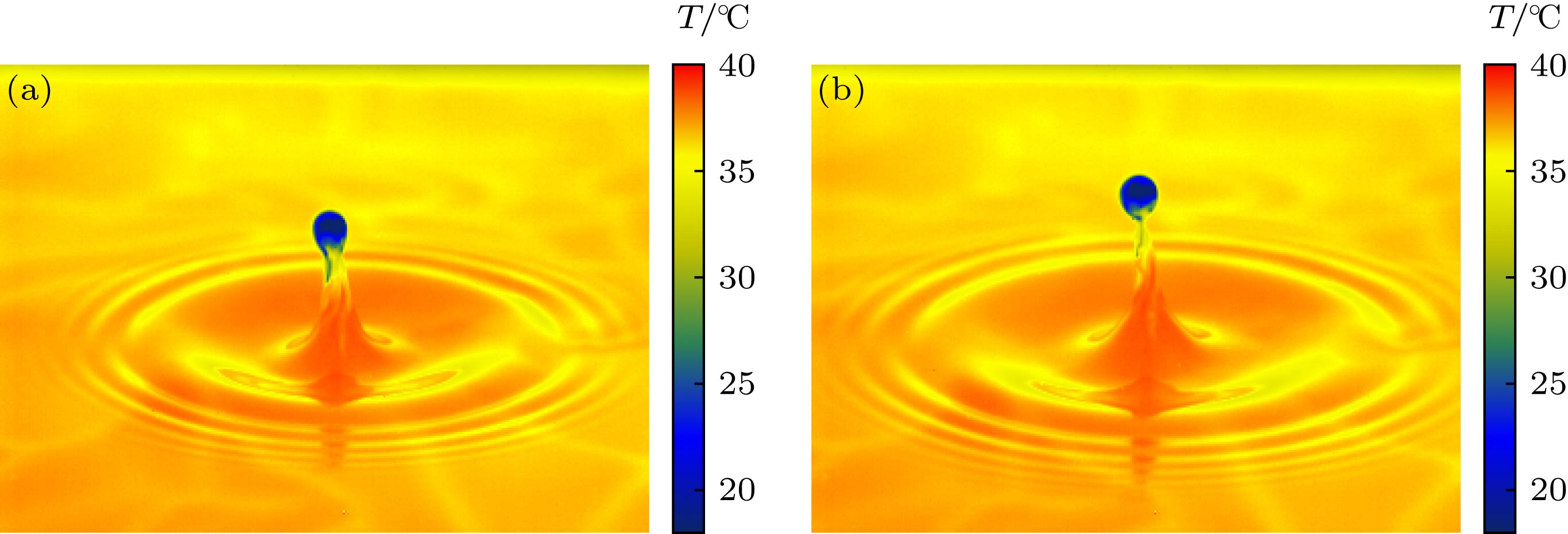-
A high speed camera-infrared camera synchronous shoot device is built to record the process of cold droplet impacting on hot pool and lots of experiments have been done in this paper. The mixing morphology and the temperature variation of the impact area are observed and analyzed based on simultaneous images taken by the infrared camera and the high speed camera. The influences of the impact conditions on mixing and heat transfer during droplet impacting on hot pool are also studied and then the dimensionless relationship between mean temperature of the impact area and impact condition is established. The experimental results show that the mixing of cold liquid from droplet and hot pool is one of the main reasons for the temperature increase in impact area. The cold droplet does not integrate with hot pool immediately at the beginning of impact and the droplet is deformed into a shape of " crescent moon” which is trapped near the crater. The interface between cold liquid from droplet and hot pool can be observed in a simultaneous image. When the crater begins to collapse, the mixing liquid is mainly divided into two parts: one part is left and curled at the bottom of the pool while the other part is rising with the central jet. Despite the stagnation at the beginning, the mean temperature increases with time going by in the early stage. However the growth trend is interrupted by the cavity collapse. The mean temperature arrives at a peak after the crater has reached its maximum depth. The peak of the dimensionless temperature
$T_{{\rm{peak}}}^{\rm{*}}$ increases with the Weber number increasing and$T_{{\rm{peak}}}^{\rm{*}}$ can be described as$T_{{\rm{peak}}}^{\rm{*}} = 0.34W{e^{0.15}}$ . The dimensionless time of the peak${\tau _{{\rm{peak}}}}$ increases with the Froude number increasing. In this paper, we also find that the dimensionless time of the peak${\tau _{{\rm{peak}}}}$ can be described as${\tau _{{\rm{peak}}}} = 0.85F{r^{5/8}}$ . After the mean temperature reaches the peak, the growth trend presents a trend of fluctuations. The shape of the trend line during this stage is related to Weber number. When the Weber number is small, the growth trend of mean temperature decreases in a short period of time and then restores and increases with time going by. When the Weber number is bigger, the growth rate becomes smoother during the long fluctuation period. The mean temperature will increase very slowly at the end of the impact. Only some cold spot are left on the surface during this period and the rising of the mean temperature becomes steady and slow.-
Keywords:
- simultaneous images /
- droplet impact /
- hot pool /
- heat transfer
[1] Worthington A M, Cole R S 1897 Phil. Trans. Roy. Soc. 189 A137
 Google Scholar
Google Scholar
[2] Rein M 1993 Fluid Dyn. Res. 12 61
 Google Scholar
Google Scholar
[3] Rein M 1996 J. Fluid Mech. 306 150
[4] Yarin A L, Weiss D A 1995 J. Fluid Mech. 283 141
 Google Scholar
Google Scholar
[5] Cossali G E, Coghe A, Marengo M 1997 Exp. Fluids 22 465
[6] Roisman I V, Tropea C 2002 J. Fluid Mech. 472 373
 Google Scholar
Google Scholar
[7] Roisman I V, van Hinsberg N P, Tropea C 2008 Phys. Rev. E 77 046305
 Google Scholar
Google Scholar
[8] Bisighini A, Cossali G E, Tropea C 2010 Phys. Rev. E 82 036319
 Google Scholar
Google Scholar
[9] Mitchell A J, Simmons K, Hann D 2015 Proceedings of the ASME International Mechanical Engineering Congress and Exposition Houston, USA, Novemeber 13−19, 2015 pV001T01A038
[10] Mitchell A J, Hann D, Simmons K 2017 Proceedings of the ASME Turbo Expo Charlotte, USA June 26−30, 2017 pV02DT48A006
[11] Hann D B, Cherdantsev A V, Mitchell A 2016 Exp. Fluids 27 46
[12] Moreira A L N, Moita A S, Panao M R 2010 Prog. Energ. Combust 36 554
 Google Scholar
Google Scholar
[13] Bostanci H, Rini D P, Kizito J P 2012 Int. J. Heat Mass Transfer 55 3849
 Google Scholar
Google Scholar
[14] Zhang Z, Li J, Jiang P 2013 Appl. Therm. Eng. 51 102
 Google Scholar
Google Scholar
[15] Labergue A, Gradeck M, Lemoine F 2015 Int. J. Heat Mass Transfer 81 889
 Google Scholar
Google Scholar
[16] Bernardin J, Stebbins C, Mudawar I 1997 Int. J. Heat Mass Transfer 40 247
 Google Scholar
Google Scholar
[17] Pasandideh-Fard M, Aziz S, Chandra S, Mostaghimi J 2001 Int. J. Heat Fluid Flow 22 201
 Google Scholar
Google Scholar
[18] Castanet G, Liénart T, Lemoine F 2009 Int. J. Heat Mass Transfer 52 670
 Google Scholar
Google Scholar
[19] 叶学民, 李永康, 李春曦 2016 65 234701
 Google Scholar
Google Scholar
Ye X M, Li Y K, Li C X 2016 Acta Phys. Sin. 65 234701
 Google Scholar
Google Scholar
[20] Gao X, Kong L, Li R 2017 Int. J. Heat Mass Transfer 108 1068
 Google Scholar
Google Scholar
[21] Liang G, Mu X, Guo Y 2016 Numer. Heat Tr. B: Fund 69 575
 Google Scholar
Google Scholar
-
图 6 无量纲平均温度极值点的温度值、出现时间与工况条件的关系 (a)无量纲平均温度极值点的温度值; (b)无量纲平均温度极值点的出现时间
Figure 6. The peak of dimensionless temperature and the dimensionless time of the peak: (a) The peak of dimensionless temperature as a function of Weber number; (b) the dimensionless time of the peak as a function of Froude number.
-
[1] Worthington A M, Cole R S 1897 Phil. Trans. Roy. Soc. 189 A137
 Google Scholar
Google Scholar
[2] Rein M 1993 Fluid Dyn. Res. 12 61
 Google Scholar
Google Scholar
[3] Rein M 1996 J. Fluid Mech. 306 150
[4] Yarin A L, Weiss D A 1995 J. Fluid Mech. 283 141
 Google Scholar
Google Scholar
[5] Cossali G E, Coghe A, Marengo M 1997 Exp. Fluids 22 465
[6] Roisman I V, Tropea C 2002 J. Fluid Mech. 472 373
 Google Scholar
Google Scholar
[7] Roisman I V, van Hinsberg N P, Tropea C 2008 Phys. Rev. E 77 046305
 Google Scholar
Google Scholar
[8] Bisighini A, Cossali G E, Tropea C 2010 Phys. Rev. E 82 036319
 Google Scholar
Google Scholar
[9] Mitchell A J, Simmons K, Hann D 2015 Proceedings of the ASME International Mechanical Engineering Congress and Exposition Houston, USA, Novemeber 13−19, 2015 pV001T01A038
[10] Mitchell A J, Hann D, Simmons K 2017 Proceedings of the ASME Turbo Expo Charlotte, USA June 26−30, 2017 pV02DT48A006
[11] Hann D B, Cherdantsev A V, Mitchell A 2016 Exp. Fluids 27 46
[12] Moreira A L N, Moita A S, Panao M R 2010 Prog. Energ. Combust 36 554
 Google Scholar
Google Scholar
[13] Bostanci H, Rini D P, Kizito J P 2012 Int. J. Heat Mass Transfer 55 3849
 Google Scholar
Google Scholar
[14] Zhang Z, Li J, Jiang P 2013 Appl. Therm. Eng. 51 102
 Google Scholar
Google Scholar
[15] Labergue A, Gradeck M, Lemoine F 2015 Int. J. Heat Mass Transfer 81 889
 Google Scholar
Google Scholar
[16] Bernardin J, Stebbins C, Mudawar I 1997 Int. J. Heat Mass Transfer 40 247
 Google Scholar
Google Scholar
[17] Pasandideh-Fard M, Aziz S, Chandra S, Mostaghimi J 2001 Int. J. Heat Fluid Flow 22 201
 Google Scholar
Google Scholar
[18] Castanet G, Liénart T, Lemoine F 2009 Int. J. Heat Mass Transfer 52 670
 Google Scholar
Google Scholar
[19] 叶学民, 李永康, 李春曦 2016 65 234701
 Google Scholar
Google Scholar
Ye X M, Li Y K, Li C X 2016 Acta Phys. Sin. 65 234701
 Google Scholar
Google Scholar
[20] Gao X, Kong L, Li R 2017 Int. J. Heat Mass Transfer 108 1068
 Google Scholar
Google Scholar
[21] Liang G, Mu X, Guo Y 2016 Numer. Heat Tr. B: Fund 69 575
 Google Scholar
Google Scholar
Catalog
Metrics
- Abstract views: 9892
- PDF Downloads: 82
- Cited By: 0



















 DownLoad:
DownLoad:





